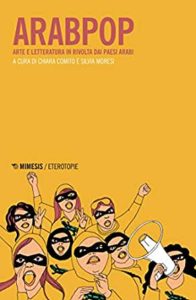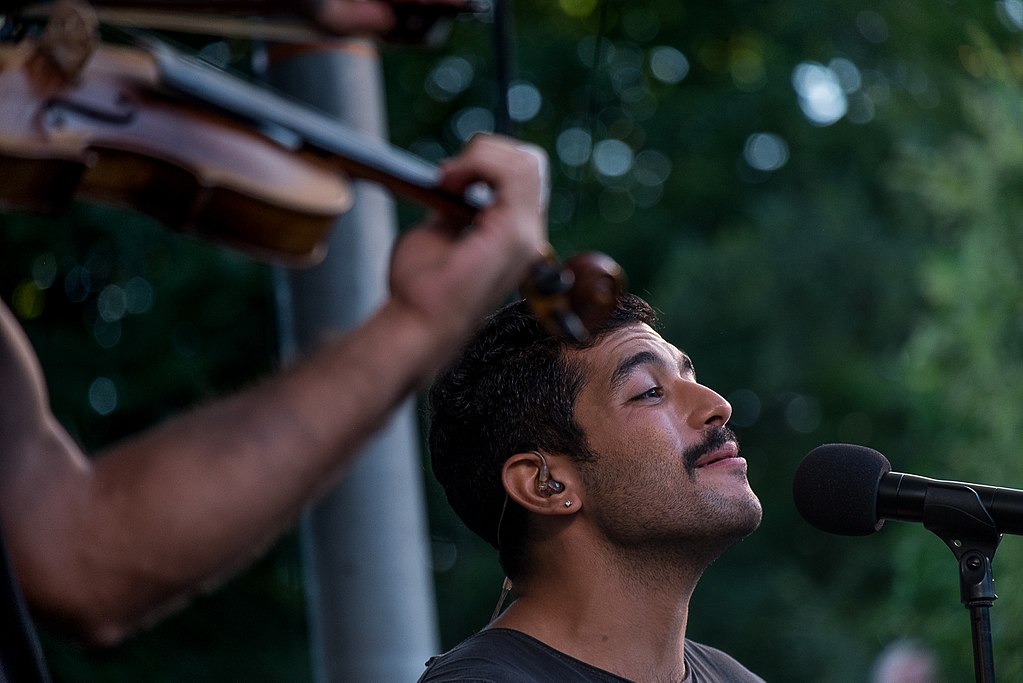The book is called Arabpop and is authored by Arabists Chiara Comito and Silvia Moresi. They invited eight experts to explain how the scenario that we see today has been long anticipated by the voices of artists, musicians and authors in the Arab world. The protagonist is a young generation who dared to ask for freedom, calling into question political, religious and gender affiliations.
The authors explains that Italy the Arab Springs have been analyzed quite superficially by the mainstream media. Considering the pivotal role the country has for migrations – bridging the Mediterranean with the heart of Europe – it is necessary to create a deeper understanding.

“The Arab Springs have been mainly described them as sudden and unexpected events, or as power games between Western states,” they say. “The message that came across was that Arab citizens would always be passive, and unable to be masters of their own destiny. The real protagonists of this season were completely ignored. “These were the young people who took to the streets to demand the fall of regimes in power for more than thirty years.”
The peculiarity of this book lies the analysis of the Arab Springs not from a political point of view, but from a cultural one: “No one was telling of burst of creativity that arose from those months of passion, revolt, enthusiasm and ferment. With Arabpop we tried to fill those gaps.”
NM: How did the idea for the publication of Arabpop come about?
CC: Arabpop was born from the need to chronicle the Arab revolutions from a different point of view beyond the lens of mainstream media, namely geopolitics. We convey this new perspective through novels, poems, films, songs and artistic expressions that were produced since 2010 in Arab countries and the diaspora.
Arabpop is not a book for experts, but to all those readers interested in the Arab region. We attempt to change the narrative for the general Italian public, which often knows the Arab world only through terrorism, wars and jihad, but is not aware of its great and multilayered cultural production.
NM: For this volume you have recruited eight female experts in Arab culture. Were you trying to convey a broader and more inclusive narrative?
C.C: It wasn’t really a deliberate choice, but more of a coincidence. I happen to know more women researchers and experts in contemporary Arab art and literature. The authors of Arabpop are scholars, Arabists, interpreters, journalists, researchers, professors and translators. Beyond our field of expertise, we all share a deep curiosity on the most contemporary artistic and cultural expressions of the Arab world.
NM: Can you outline the Italian context in which this book operates, and the need to go beyond the cultural stereotypes present in Italian culture?
S.M.: In Italy, Arab societies are often still described through the usual schemes dating back to the colonial period, which are therefore false and prejudicial. They make the Arab world appear old, passive and retrograde. In Italy, a true process of “decolonization” of culture and knowledge has never been started. The “Arab” is only identified as a migrant, whose actual origin and culture are ignored.
Furthermore, in Italy also the studies of Arabistics have not managed to completely overcome a certain orientalist gaze, and they have excessively concentrated on classical Arab history. Contemporary culture and political phenomena were often ignored, causing misunderstandings of the 2011 revolutions.
This is also why Arabpop tries to give a new and more realistic image of Arab societies.
NM: How shall we look at the Arab Spring ten years later, from an artistic perspective?
S.M.: We now see that if the political revolutions of 2011 failed (at least for the moment), on the other hand the cultural revolution still continues, influencing more and more countries. Perhaps it is no coincidence that in 2019, just as we were writing the book, revolts broke out in Algeria, Sudan, Iraq and Lebanon, countries that had not experienced the previous revolutionary foment.
The cultural and artistic revolution, born from the events of 2011 that changed Arab societies, is perhaps today a sort of resistance against a new shift towards obscurantism. This memory of resistance can determine new social and political revolutions to come.
NM: The text analyzes how practices apparently derived from Western culture have adapted and changed at their roots in a purely Arab context, becoming new expressions altogether. Can you give us some examples?
C.C.: In recent years, the politics, society and culture of Arab countries have often been explained in reference to the politics, society and culture of the Western world. There are designers such as the Lebanese Mazen Kerbaj who has been called the Lebanese “Picasso” or musicians, like Hamed Sinno, frontman of the pop-rock group Mashrou ‘Leila, and LGBT rights activist, who is often referred to as the “Freddie Mercury” of Lebanon.
I think we should start talking about these countries without constantly referring them to our cultural parameters. This is not to say that we cannot find links with Western cultural productions. However, we must consider that each culture is interconnected with many others, and looking for the ultimate source makes little sense.
NM: Arabpop’s focus is on the younger generations who have experienced the Arab Spring. Do we see a new generation appearing on the scene already?
C.C.: People of all ages participated in the protests, but surely the young people of 20 and 30 are those who were animated by a greater desire to change things. They are the main protagonists of the cultural revolution that we tell in the book. Over the years, things have changed in many countries, and in many cases unfortunately got worse. The spaces of openness that allowed culture to express itself freely have disappeared, see the case of Egypt, Syria and Yemen. Therefore both the old and new generations of artists have a hard time finding spaces to express themselves and restrictions imposed everywhere, due to the Covid-19 pandemic.
NM: The cover artist is from Beirut, a city that is currently going through great difficulties, as well as many other countries you talk about in the book. How did you manage to make the content of the book current, considering the rapid and dramatic changes in the socio-political situation in the Arab world?
C.C.: We conceived and wrote Arabpop in 2019, when the protests in Iraq, Lebanon, Algeria and Sudan had just started: since the introduction we noted that the book is a work in progress. In Arabpop we tell about the protests that began between 2010 and 2011, with the awareness that even those experiences that began ten years ago are still carrying onto this day.
NM: Is it art that changes society, or does society change art?
S.M.: I believe they influence each other. If we take poetry, for example, this was both engine of revolutions, and morphed by them. Poetry has always been the most popular artistic expression in the Arab world and, in fact, the first slogans shouted during the demonstrations were the verses of the poets of older generations, which encouraged the demonstrators. Art is something alive, dynamic, and not static, meant to broke old patterns and mixing languages, in order to better express new emotions, new ideas. Art is the mirror of the society that produced it, but it is also what inspires change.
Image credit: Anteger11

